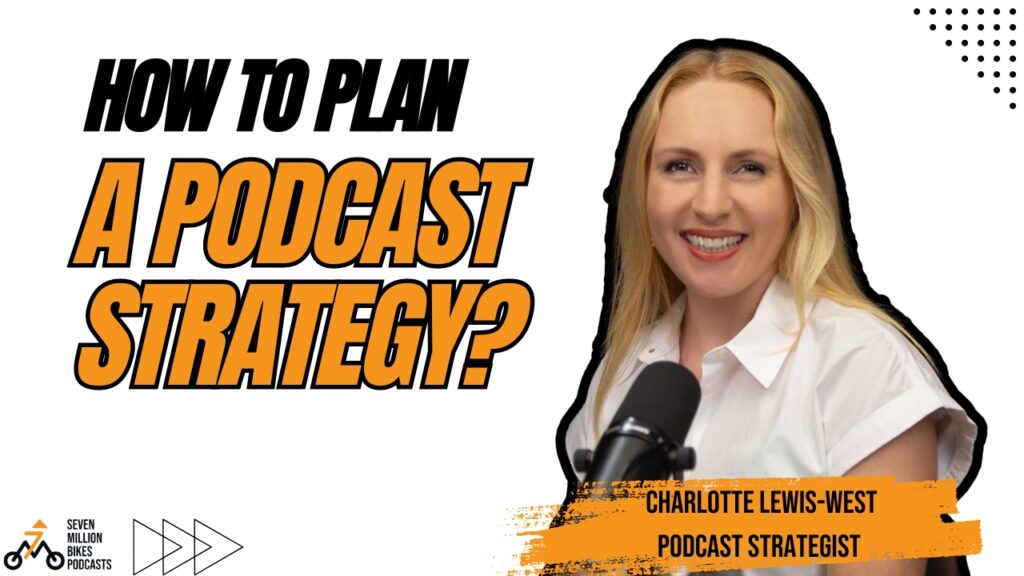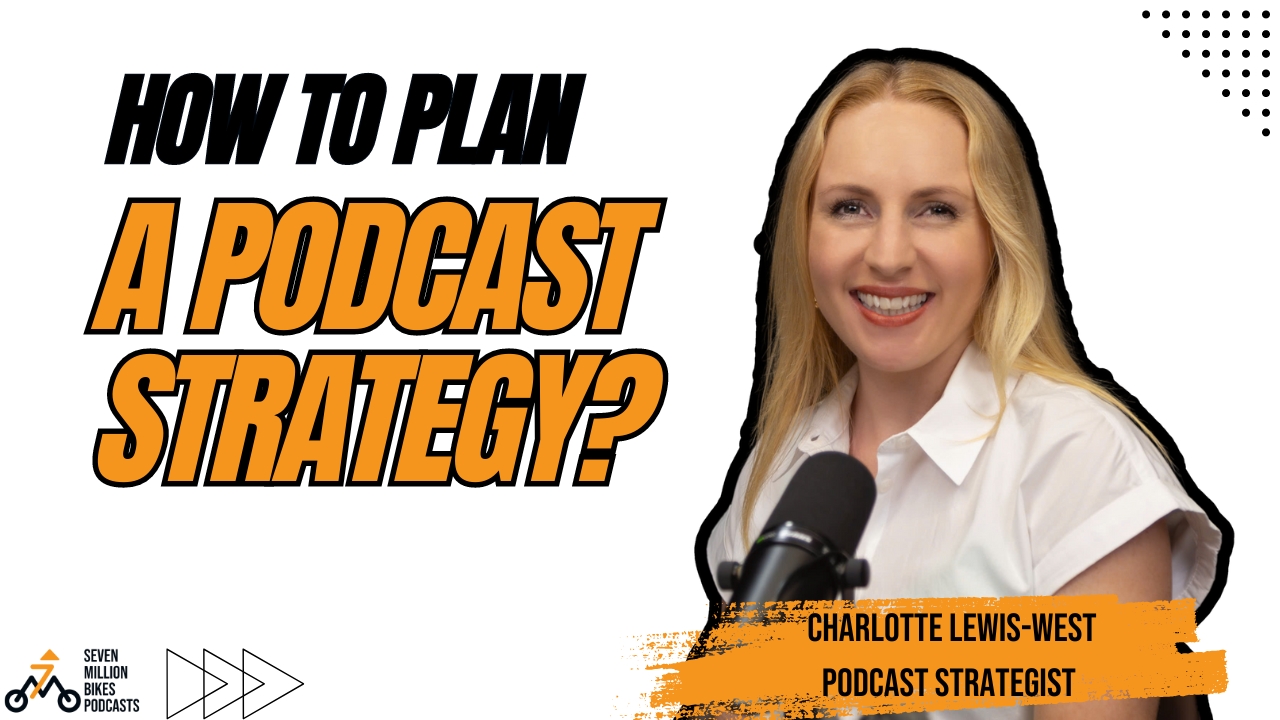How To Plan An Effective Strategy
Before hitting record on your podcast, having a solid plan in place is crucial. A well-thought-out strategy can help you with more things than you thought!
My name is Niall Mackay, The Podcast Guy. After many years in the industry, I truly understand how important a detailed plan is.
So in this episode, I invited Charlotte Lewis-West, podcast strategist with Seven Million Bikes Podcasts onto Smarter Podcasting. With years of experience in podcast consultancy, she has helped major brands craft impactful content, bringing a deep understanding of the power of audio storytelling and the importance of strategy in podcasting.
Let’s see how we can create an effective plan for our show.

Why Should You Plan for Your Podcast? The Power of Niche
Many people came to us and asked that question. One of the first things we discussed was why planning is so crucial for your podcast’s success. A lot of people think they can just jump on the mic and start talking about anything and everything. But if you want your podcast to go anywhere, you need a plan.
Many podcasters create content without any plan in place, and this often leads to frustration when the show doesn’t take off. I’ve seen this happen with podcasters who come to me for help. They’ll say, “I’ve got 10 episodes, but no one’s listening. What’s wrong?” And the answer, almost always, is that they didn’t put enough work into the early stages.

We’ve worked with clients in industries you wouldn’t think would need a podcast. For example, Charlotte worked with legal and accounting firms. Initially, you might think, “Why would these industries need podcasts?” But that’s the beauty of niche podcasting. Whether it’s knitting, finance, or law, if you’re passionate about something, there’s likely a dedicated audience out there.
The mistake many new podcasters make is trying to appeal to everyone. As Charlotte explained, this can often backfire. Instead, you should focus on what you’re passionate about and tailor your content for the people who share that interest. Once you identify your niche, everything else starts to fall into place.
For example, with Smarter Podcasting, my niche is helping people create better podcasts. That’s the focus, and everything I do—from the topics I choose to the guests I invite—feeds into that goal.
The Importance of Strategy – How To Plan An Effective Strategy
Whether you’re starting from scratch or looking to improve an existing podcast, having a solid strategy is key to ensuring your show stands out and resonates with the right audience.
Define Your Objective
The first step Charlotte emphasized is understanding why you’re starting your podcast. You need to know your purpose before anything else. For example:
- Are you looking to build brand awareness or promote a product?
- Do you want to entertain, educate, or inspire your listeners?
- Are you hoping your audience will follow you, sign up for a course, or engage with your business?
Charlotte pointed out that defining your objective will shape everything else about your podcast. This clarity helps keep your content focused and aligned with your goals, ensuring each episode serves a purpose.
Identify Your Audience
Once your objective is clear, the next step is identifying who you’re speaking to. Charlotte stressed that knowing your audience is crucial because it determines your podcast’s tone, format, and structure. You need to ask:
- Who is your ideal listener?
- What are their interests and needs?
- How do they consume content, and where do they spend their time?
Your audience will be informed of the type of content you create, how you deliver it, and even how long your episodes should be. For example, Charlotte mentioned that in some regions, shorter episodes of 35–45 minutes work best, while in others, like the U.S., listeners are more comfortable with longer, two-hour episodes.
Find Your Niche
One of the most important aspects of planning is identifying your podcast niche. In our conversation, Charlotte explained how people often overlook niche topics, assuming they won’t attract listeners. However, there’s always an audience for everything—whether it’s finance, law, or even knitting.
We’ve worked with podcasts in industries like accounting and legal services that have loyal followings. The key is to focus on a specific niche and target your content toward that audience. Charlotte suggested that by narrowing your focus, you’re more likely to stand out and create a dedicated listener base, rather than trying to appeal to everyone.
Decide on the Format
After defining your audience and niche, the next step is deciding on your podcast’s format. According to Charlotte, this includes:
- Choosing whether your show will be interview-based, solo, or co-hosted.
- Determining the length of each episode based on your audience’s preferences.
- Deciding whether to create an audio-only podcast or add video content for platforms like YouTube.
Charlotte mentioned that some brands might benefit more from audio-only content if video isn’t necessary, but video is a powerful tool for promotion, especially on social media.
Plan Your Content
Once you have your format, it’s time to plan your content. Charlotte emphasized that planning your episodes in advance helps keep everything organized and aligned with your overall strategy. Here’s what to consider:
- Content Calendar: Create a calendar that maps out your episodes for several weeks or months.
- Topics: Brainstorm episode ideas that align with your niche and are valuable to your audience.
- Scripting: Decide how much of your podcast will be scripted versus free-flowing conversation.
Charlotte also stressed the importance of researching your competitors. Look at what others in your niche are doing—what works for them, and what doesn’t? This can give you ideas for how to make your content stand out and offer something unique.
Measure Success
Finally, Charlotte emphasized the importance of measuring success. It’s not just about download numbers—depending on your goals, success could look different for every podcast. You might want to track:
- Increased engagement on social media.
- Higher conversion rates for a product or service.
- More traffic to your website.
Setting up clear metrics helps you assess what’s working and what isn’t, allowing you to adjust your strategy to meet your objectives.
Planning a podcast isn’t something you can rush into. As Charlotte explained, a solid strategy is the foundation of any successful show. By taking the time to define your objectives, identify your audience, find your niche, and develop a content and promotion strategy, you set yourself up for long-term success.

How to Promote Your Podcast: Key Tips and Strategies
“How do I promote my podcast?” It’s a question that comes up time and again, and for good reason—no matter how great your content is, it’s not going to gain traction if people don’t know it exists.
The truth is, promoting a podcast isn’t one-size-fits-all. Your strategy should depend on your niche and your audience.
Here are some tips from strategist Charlotte:
- Know Your Audience and Choose the Right Platforms
The first step in promoting your podcast is understanding where your audience is and how they consume content. As Charlotte pointed out, promoting a podcast in different niches requires tailored approaches. For example:
- If your podcast is for finance professionals, LinkedIn might be your best platform for promotion.
- If your podcast is focused on arts, crafts, or lifestyle topics, Instagram or TikTok would be more effective.
I will provide you with some specifications for each platform. You can see which is the most suitable for your target audience:
Platform-Specific Approach:
- LinkedIn: Use LinkedIn for sharing blog-style posts about your episodes, key takeaways, or industry insights. Engage with relevant groups and encourage discussion around your podcast topic.
- Instagram: For lifestyle and personal podcasts, use Instagram Stories, Reels, and posts to show behind-the-scenes content or teaser clips from episodes.
- TikTok: For podcasts aimed at a younger, visually-oriented audience, TikTok videos are essential. Share short, engaging clips that highlight interesting moments or key insights from the episode.
- Reddit: For niche topics, Reddit is a great place to promote. Find relevant subreddits where your target audience is already discussing related topics. Engage genuinely with the community by contributing to discussions, and share your episodes when appropriate.
I usually share blogs on LinkedIn, ask questions and topics on Reddit and create short and engaging video content on Facebook or Instagram.
- Leverage Organic Promotion
Organic promotion is free, and when done right, it can significantly boost your podcast’s reach. Charlotte shared several key strategies to ensure your organic promotion works effectively.
Guest Promotion:
One of the most powerful yet underused strategies is getting your podcast guests to promote the episode. This is especially effective if your guest has a good following. When your guests share their episode with their audience, it exposes your podcast to new listeners who might not have found it otherwise.
- Write the Post for Them: To make it easier for your guests, write the social media post for them. Include a pre-written post with the episode link, hashtags, and tags. This takes the pressure off the guest to come up with something on their own, and it increases the likelihood that they’ll share the episode.
- Timely Promotion: Often, podcasts are recorded weeks or months in advance. By the time the episode is released, your guest might have forgotten some of the details. Make it easy for them to share by providing a ready-made post right when the episode goes live.

Leverage Social Media:
Social media is a must for promoting your podcast. Consistently sharing episodes and engaging with your audience is key to growing your listener base.
- Instagram and TikTok: Regularly post teaser clips, episode highlights, and behind-the-scenes content. Use features like polls and Q&A stickers to engage with your audience and get them excited about upcoming episodes.
- Reddit and Forums: Reddit threads and other forums are great for promoting niche podcasts. Find communities related to your topic and contribute valuable insights. Once you’ve established a presence, you can share relevant podcast episodes, ensuring they add value to ongoing discussions.
Engaging with Your Audience:
Regularly interact with your audience on social media. Ask for feedback, encourage them to share episodes, and make them feel like part of the conversation. The more engaged your audience feels, the more likely they are to recommend your podcast to others.
- Consider Paid Promotion
If you have a marketing budget, paid advertising is one of the most effective way. However, it’s important to spend wisely, targeting platforms where your audience already consumes content. Charlotte shared a few key recommendations for effective paid promotion.
Spotify and YouTube Ads:
Spotify and YouTube are two of the most effective platforms for running podcast ads. Both platforms allow you to target users who are already in the mindset of consuming audio or video content, making them more likely to check out your show.
- Spotify Ads: Spotify offers targeted ads specifically for podcast listeners. You can tailor your ads based on listener demographics, interests, and even their current podcast habits. For example, if you have a finance podcast, you can target listeners of finance-related shows.
- YouTube Ads: YouTube is great for reaching people who already watch video podcasts. The cost to run YouTube ads is relatively low, and the platform allows you to target specific interest groups, ensuring your ads are shown to relevant viewers.
Advertising on Other Podcasts:
Another highly effective paid strategy is to advertise on other podcasts. This allows you to tap into an audience that’s already invested in listening to podcasts.
- Host-Read Ads: Many podcasts offer host-read ads, where the host of a popular podcast promotes your show to their audience. This is powerful because podcast listeners often trust the recommendations of their favorite hosts.
- ACAST: Platforms like ACAST allow you to run ads across a collection of podcasts in a specific genre. For example, you could run ads on a variety of business podcasts if that’s your niche, giving you access to a wider audience at once.
- Video Content and Short-Form Media
Video content is one of the most effective tools for promoting your podcast. Charlotte and I discussed how short-form videos can significantly increase your reach and drive new listeners to your podcast.
Charlotte pointed out that videograms (short, engaging video clips from your podcast) are incredibly powerful. A well-edited 30-second video clip can hook viewers right before an exciting moment or an interesting revelation, leaving them eager to check out the full episode. This strategy is widely used by popular podcasts like Diary of a CEO to keep their audience engaged.
- Highlight Key Moments: Identify the most engaging, funny, or insightful moments from your episodes and create 30–60-second clips. Tease the best parts so viewers are curious to hear the rest of the conversation.
- Include a Call to Action: Always include a clear call to action in your video. Whether it’s “Watch the full episode on YouTube,” “Listen on Spotify,” or “Subscribe for more,” direct viewers to the full podcast.
- Edit for Engagement: Make sure the video is snappy and visually appealing. Add captions, highlight important quotes, and make sure the video is framed well. Even small editing tweaks can make a huge difference in viewer engagement.

Conclusion
This conversation with Charlotte Lewis-West, a podcast strategist with years of experience, offered incredibly valuable insights into how to plan and promote your podcast effectively.
I hope you can find some useful strategies for your own show!
If you want to have a custom plan for your own show, contact HERE!
Need More Support? Book a Free Consultation NOW!
Podcasters out there, if you have your podcast community with dedicated listeners, it’s time to turn them into loyal buyers! Let me help you with 5 secrets in my E-book!
Don’t miss out on this opportunity to boost your podcast’s revenue.



2 thoughts on “How To Plan An Effective Strategy – A Talk With Podcast Strategist Charlotte Lewis-West”
Comments are closed.